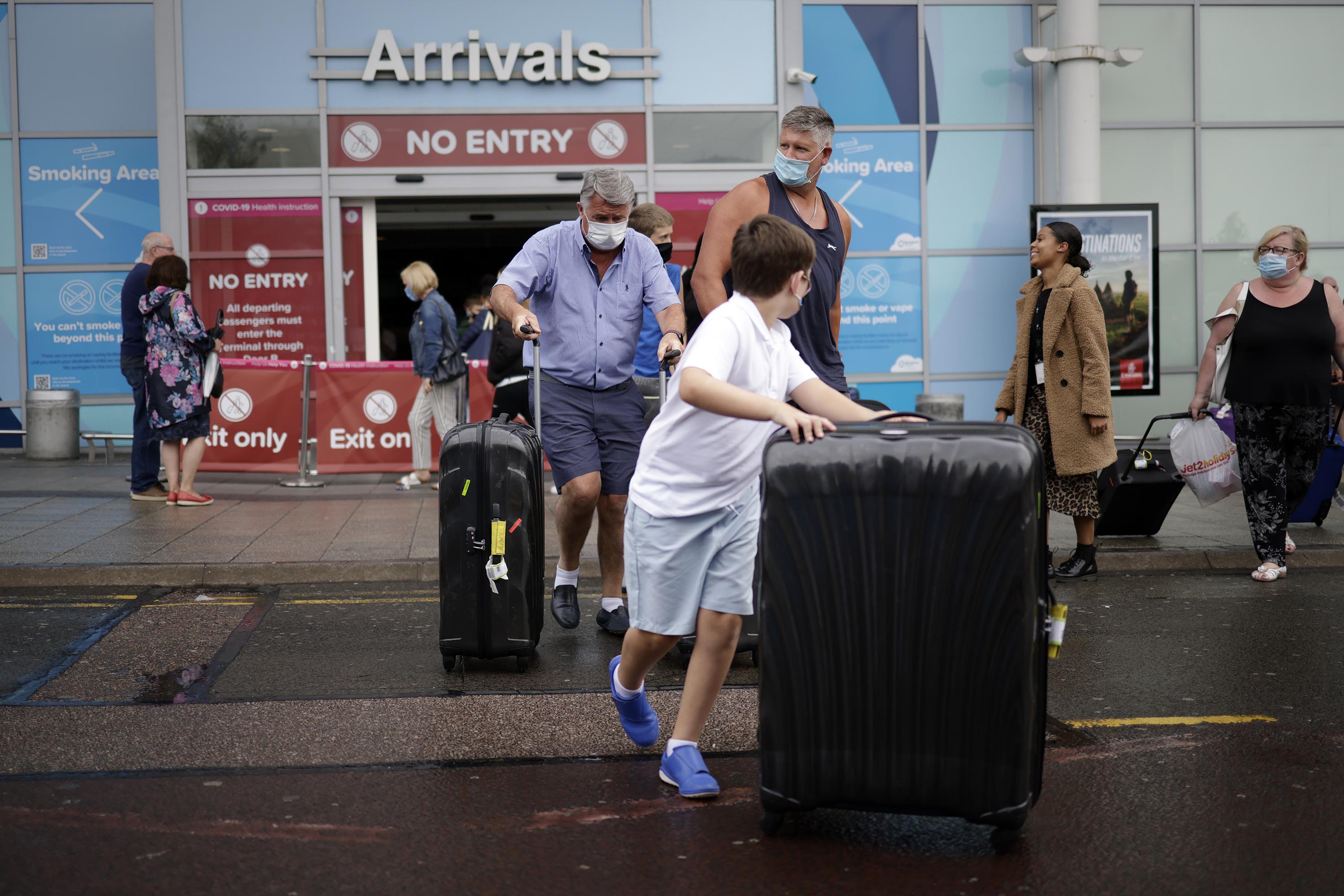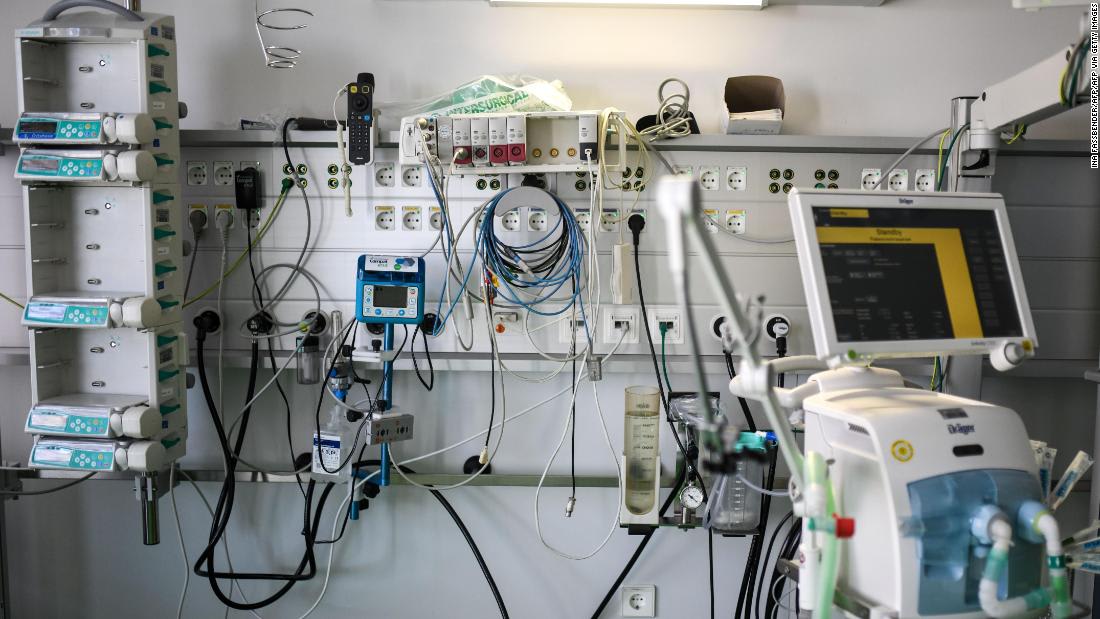German economy has sharpest decline on record
From CNN’s Fred Pleitgen in Berlin
The German economy shrank by a record 10.1% in the second quarter as the full impact of the pandemic crisis hit Europe’s largest economy.
This is the largest quarterly decline since records began in 1970 and a bigger drop than the 2009 financial crisis, when the economy contracted 4.7% in one quarter.
According to the data from Germany’s National Statistics Office, a massive slump was recorded for exports and imports of goods and services as well as housing spending.
The numbers: Germany has recorded almost 209,000 cases and more than 9,000 deaths, according to Johns Hopkins University figures. The country's center for disease prevention, the Robert Koch Institute, reported that case numbers spiked on Friday and have been rising in recent weeks following the relaxation of lockdown measures.
Europe still hasn't won its battle against Covid-19, says Italy's Health Minister
From CNN's Valentina DiDonato in Rome and Schams Elwazer in London
Italy’s Health Minister warned on Thursday that Europe’s battle against coronavirus has not been won as the continent braces for a possible second wave with infection rates rising in several countries.
In a statement, Roberto Speranza said he was concerned by the “latest signals from France, Spain and Germany that still tell us the battle has not been won, not even in Europe,” adding that Italians need to act with “strength of prudence.”
Italy was the first European country to see a wave of coronavirus infections and its northern province of Lombardy was, for weeks, considered the European epicenter of the disease.
Cremona Hospital in Lombardy – one of the hospitals that was hardest hit at the peak of the crisis – tells CNN it is already being told to plan for the worst.
CNN visited Cremona Hospital in March 2020. Watch CNN international correspondent Melissa Bell's report:
Welcome to the NBA bubble -- at Disney World
From CNN's Don Riddell
For the next two-and-a-half months, the top basketball players in the US will all be residing at Disney World in Orlando, Florida.
But it's not necessarily the treat you might think; in fact some -- like the Lakers' LeBron James and the Trail Blazers' Damian Lillard -- have compared it to a prison sentence, both using slang on social media, saying they were off "to do a bid."
It's probably not the kind of gratitude the NBA was expecting when they wrestled with the biggest logistical challenge ever faced in the 74-year history of the league: how to resume and finish up a season amidst a global pandemic in a country which has struggled in the fight against Covid-19.
Certainly Philadelphia 76ers coach Brett Brown struck a more positive note.
I think what the NBA has done ... in the environment we are all in is spectacularly brilliant," Brown told reporters. "I think it's elite -- I have zero complaints about anything that might prohibit us from doing our job."
And according to UFC boss Dana White, the 'bubble' approach is currently the only way forward for US sports.
"This isn't going to work outside of a bubble," White told CNN Sport earlier this week after the UFC staged a series of bouts on Yas Island in Abu Dhabi.
So far the NBA's approach looks to be working. On Wednesday, the National Basketball Association (NBA) and players' union announced that none of the 344 players tested since July 20 had tested positive for the coronavirus.
Read the full story:
UK may extend Covid-19 self-isolation period amid Europe "second wave" concerns
From CNN's Sharon Braithwaite in London
 Travelers exit the arrivals terminal at Birmingham Airport on July 27, in Birmingham, England. Christopher Furlong/Getty Images
Travelers exit the arrivals terminal at Birmingham Airport on July 27, in Birmingham, England. Christopher Furlong/Getty ImagesThe UK is expected to extend the self-isolation period for people showing possible Covid-19 symptoms, as concerns grow over a second wave of infections in Europe.
Speaking to Sky News Thursday, UK Health Secretary Matt Hancock stopped short of confirming that the self-isolation period would be extended from seven to 10 days, but said the country’s Chief Medical Officer would be announcing details later in the day and that the decision was “clinically led.”
Second wave: Hancock said he is worried about a second wave in Europe and that the UK "won't hesitate to act" to boost quarantine measures if needed.
I think you can see a second wave starting to roll across Europe, and we've got to do everything we can to prevent it from reaching these shores, and to tackle it,” Hancock said.
He added that the UK government is keeping the quarantine rules “under review all of the time, and we are taking action and we will take action if it is needed to keep this country safe."
Quarantine testing: Hancock said the UK government is considering using testing to shorten the quarantine period imposed on travelers returning to England from countries such as Spain.
"We are working on whether by testing people during that quarantine it is safe to then be able to release them earlier. But we are not imminently making an announcement on it because that work is not concluded,” Hancock told the BBC.
Hancock also raised concerns about the risk of an increase of coronavirus cases in the UK. "Of course there's a danger of an increase and we've all seen what this virus can do and how fast it can move,” he told BBC radio, adding that new countries could be added to quarantine list in next few days.
It's just past 10:30 a.m. in Johannesburg and 5:30 p.m. in Tokyo. Here's the latest on the pandemic
Global coronavirus cases surpassed 17 million on Thursday, including more than 667,000 deaths, according to Johns Hopkins University.
Here's the latest headlines from around the globe:
We're only just beginning to learn how Covid-19 affects the brain
From Dr. Minali Nigam and CNN's Dr. Sanjay Gupta
One of the more puzzling aspects of the novel coronavirus is just how many organ systems are impacted through the course of the disease. We've heard about the heart, lungs and respiratory symptoms, but a growing mystery is its impact on the nervous system.
A report in April suggested more than a third of 214 Covid-19 patients studied experienced neurological complications ranging from loss of smell to stroke.
The virus can lead to neurological complications like delirium, brain inflammation, stroke and nerve damage. In a University College London study published earlier this month, 10 out of 43 patients had "temporary brain dysfunction" and delirium, while 12 had brain inflammation, eight had strokes and eight had nerve damage.
Another paper published last month in The Lancet Psychiatry looked at 153 patients in the UK and found even those younger than 60 could have psychosis, depression or strokes.
How this virus damages the brain and nerves still isn't totally clear. But as two physicians dedicated to the study of the nervous system, we wanted to find some answers.
Read the full story:
First dog to test positive for Covid-19 in the US has died
From CNN’s Shelby Lin Erdman
Buddy, a 7-year-old German shepherd from Staten Island, New York, who was the first dog to test positive for the coronavirus in the United States, died on July 11 after a three-month illness, according to National Geographic.
It’s unclear whether Buddy died from complication of the coronavirus, which he most likely caught from his owner Robert Mahoney -- who tested positive this spring -- or if he died from lymphoma.
Two veterinarians who were not part of his treatment, but who reviewed Buddy’s medical records for National Geographic, told the publication that the dog probably had cancer.
Contracting the virus: The dog got sick in April and Mahoney suspected he had the virus, but it wasn’t until mid-May that the family finally found a vet who would test him and who confirmed Buddy was infected.
“You tell people that your dog was positive, and they look at you [as if you have] ten heads,” owner and Robert Mahoney’s wife, Allison, told the magazine.
By June 2, the US Department of Agriculture confirmed Buddy was the first dog to test positive for the coronavirus in the US.
Some context: Fewer than 25 dogs and cats are confirmed to be infected with coronavirus in the US, according to the USDA.
There is no mandatory testing requirement for animals living in homes with Covid-19 positive people so it’s unknown how many pets in the US may be infected and whether those with underlying health conditions, similar to humans, may be at higher risk.
The US Centers for Disease Control and Prevention does offer guidance for caring for a pet with Covid-19, but it doesn’t include information about testing or information collection for veterinarians, as there’s still no solid data on how the virus affects pets.
UCLA confirms more than 150 Covid-19 cases among campus community
From CNN's Sarah Moon
 The UCLA campus in Los Angeles, California. Kirby Lee/AP
The UCLA campus in Los Angeles, California. Kirby Lee/APThe University of California, Los Angeles (UCLA) confirmed 153 cases of the coronavirus among its campus community, the university said in a news release on Wednesday.
UCLA announced last month that most classes for the 2020-2021 academic year will be online and only 15%-20% of courses will be offered on site.
Trump and his allies respond with pseudo-science as US death toll hits 150,000
Analysis from CNN's Stephen Collinson
On the day the US surpassed another tragic milestone -- 150,000 coronavirus deaths -- it became ever clearer that pseudo-science, ideological posturing and mocking the idea of a national strategy are no way to fight a deadly pandemic.
Yet President Donald Trump, his friends in Congress, members of his Cabinet, senior staff and supporters are still setting out to undermine the fact-based approaches that might get the virus under control and restore normal life.
Trump headed to Texas, currently a massive coronavirus hotspot, on a distraction mission, enjoying a photo op at an oil rig after another episode of his traveling medicine show promoting hydroxychloroquine.
"All I want to do is save lives," Trump said of a drug that his own government regulators say is not an effective cure for Covid-19.
But he was not accompanied on his trip by Republican Rep. Louie Gohmert of Texas, who discovered before getting aboard Air Force One that he had Covid-19. The congressman tested positive for coronavirus Wednesday morning during a pre-flight screening at the White House.
Gohmert has ostentatiously avoided wearing a mask. And he used his diagnosis -- thanks to that White House test -- to further trash science and undermine government medical advice by misleadingly suggesting his recent use of a face covering may have gotten him sick.
Powerful skeptics: Criticism of those who are brazenly dismissing science, playing down the impact of the virus and calling for an end to lockdowns come what may is not partisan, although most taking such positions tend to be Republicans and close to Trump's orbit.
Rather it is rooted in the fact that months into the pandemic, skeptics, including those with ultimate power, are still ignoring or undercutting the few proven tools, such as mask wearing and social distancing, that could help to quell it.
Read the full analysis:

 5 years ago
685
5 years ago
685 




